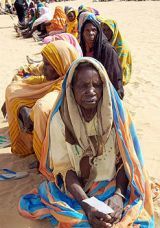Abuja talks, last chance for making peace in Darfur
By Anaclet Rwegayura
ADDIS ABABA, Ethiopia, June 9, 2005 (PANA) — Resumption of the Darfur peace
talks in Abuja, Nigeria, this weekend could be a barometer of
dawning calm in the strife-torn western region of Sudan.

|
|
Darfurian women wait for food supplies in the Abu Shouk. (AFP). |
For the impoverished, traumatised and bereaved Darfurians in
whose name every negotiator would claim to speak, the renewed
session should not turn out to be another talking shop,
punctuated with walkouts and unnecessary adjournments.
The accent should be on peace and reconciliation. All opposing
sides at the negotiations must aim at putting the kibosh on the
two-year conflict that has claimed about 200,000 lives and left
another two million as internally displaced persons.
As the peace negotiations get underway in the comfort of air
conditioned halls, the task of ensuring security keeps the “green
helmets” of the African Union (AU) Mission in Sudan (AMIS) on
their toes in the roasting temperature of Darfur.
With Janjaweed militias, who allegedly spearheaded the brutality
in Darfur behind government cover, and several vigilante groups
still heavily armed, restoring peace and security in the region
that is about the size of France will definitely task the
ingenuity of the AU mission.
“Any infantry weapon you can think of is in stock somewhere in
Darfur,” a senior military officer at Nyala sector of AMIS in
South Darfur told PANA.
It is believed, in security circles, that every adult male,
besides child-soldiers who are under nobody’s control, keeps not
less than one gun in his possession.
According to a UNICEF official, there was a decreased use of
children among government troops but not in the police force. A
preliminary assessment of the situation by the UN children’s
agency shows the situation as “still overwhelmingly acute.”
Presently, AMIS troops have no frontlines where they can
interpose with local communities to check insecurity. Depending
on the outcome of the Abuja talks, the landscape could change
after the beef-up of AMIS in the next three months.
“Sometimes we don’t have enough assurance of security for IDPs
returning to their original homes,” admitted Sector II Commander
V.W. Ajumbo in South Darfur.
The insecurity is compounded not just by the proliferation of
arms in Darfur region, but also by violations of the Humanitarian
Ceasefire Agreement that parties to the conflict signed on 8
April 2004 in neighbouring Chad.
On top of that, intermittent cases of livestock rustling and the
concomitant reaction by owners to recover their stolen animals
generate small battles that have their own repercussions on
overall security.
“This is where we come in for negotiations and eventually recover
the stolen animals,” Ajumbo explained.
AMIS officials, including the military and the civilian police,
sometimes find themselves in a situation that requires them to
encourage dialogue between rival communities.
Such instances occur when some tribal leaders and their clans
adamantly insist that they were not parties to the ceasefire
agreement, and, therefore, were not bound to adhere to the pact.
“If I was to translate what we see on security, it is appalling,”
said Ford Robinson, whose NGO, Save the Children/UK decided on 16
December 2004 to pull out of Darfur on grounds of insecurity.
His concern was that the AU mission officials followed up none of
the recommendations Save the Children/UK made before it withdrew.
“You must do an analysis in the AU so that we can have a grasp of
what trends are on focus. Things are not quite as bonhomie and
superb as one might think,” Robinson told a visiting AU
delegation.
In his opinion, many of the NGOs operating in Darfur to save
lives did not have a security capability they needed to grasp the
situation on the ground.
Whether one is a humanitarian worker or a military personnel
protecting civilians in this turbulent region, security is one
common thing that should bond them all together.
Because of insecurity, internally displaced persons do not pack
up to go back to their original homes.
Banditry and sporadic attacks by Arabs from the north in search
of pasture for their camels make IDP camps the only safe havens.
As the farming season is about to start, IDPs could ease the
relief pressure if they were assisted on time to raise food crops
and trees around their camps.
Hoping that security would have improved by harvest time, the
IDPs could return home with their own packs of food to fall back
on while they rebuild their villages.
Though the Darfur crisis has posed a challenge of its kind to
both the AU and the international community, it is a learning
experience for all involved in seeking a common solution and an
opportunity to build strong partnership for the future.
